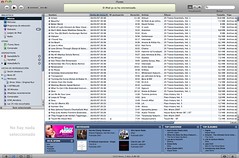
Changing the music industry-assignment
What follows is an assignment that came out of class discussions today. It’s cross posted on my Everything Tech blog as an assignment for students. If you would like to comment, please leave the comment on Everything Tech to add to our classroom discussion.
 I don’t know about you, but I had a great time in class today, but then again I was the one doing all the talking…so now it’s your turn!
I don’t know about you, but I had a great time in class today, but then again I was the one doing all the talking…so now it’s your turn!
Today we talked about the music industry and how they have tried and tried again to overcome the 5 billion P2P downloads of illegal music that was downloaded last year and continues to grow.
The problem I see is that the music industry just doesn’t get it. Even after what they consider big news with EMI now allowing DRM-Free music to be downloaded via iTunes. Is that what they think is going to stop people from downloading illegal music? At $1.29 a song…I doubt it!
So here’s my 2 cents:
The music industry is battling two different generations here. My generation that grew up with tape decks , where we recorded music from the radio and created tapes for our friends and family without a care in the world. Of course the music industry didn’t care either as the number of copies never truly impacted their profits.
, where we recorded music from the radio and created tapes for our friends and family without a care in the world. Of course the music industry didn’t care either as the number of copies never truly impacted their profits.
Then came the CD which I can still remember being this remarkable upgrade in music. The quality was amazing, and a CD could hold enough information to put extra interviews or extra songs on it to enhance the listening experience for the buyer.
Then came the ability to rip music from a CD and store it on your computer. Not long after that people found a way to share their ripped music via the web through sites like the early day Napster.
 By the time the music industry reacted, it was to late millions of songs were being shared between Internet users and the illegal swapping of music began. Ever since those days the music industry has been trying to find ways to stop the illegal swapping of music. They started embedding DRM in their music (which was cracked), and started allowing users to download individual songs rather than whole albums. All though these were improvements the illegal downloading of music became more mainstream, more accepted by people in general to the point when I tell people, “That’s illegal you know?” they look at me and say, “Really? But everyone does it!” Yes, everyone has done it and continues to do it and now I believe it is the way of a new generation….your generation.
By the time the music industry reacted, it was to late millions of songs were being shared between Internet users and the illegal swapping of music began. Ever since those days the music industry has been trying to find ways to stop the illegal swapping of music. They started embedding DRM in their music (which was cracked), and started allowing users to download individual songs rather than whole albums. All though these were improvements the illegal downloading of music became more mainstream, more accepted by people in general to the point when I tell people, “That’s illegal you know?” they look at me and say, “Really? But everyone does it!” Yes, everyone has done it and continues to do it and now I believe it is the way of a new generation….your generation.
My generation I think doesn’t mind paying 99cents for a song, because we still remember a time when we had to buy a whole CD for that one song we liked. So just the option of only buying a song..is a huge improvement to my generation.
 But your generation is different. Your generation has grown up with music always being free on the Internet. Some of you look at me like I’m crazy when I tell you I buy all my music through iTunes. You don’t understand why someone would do that when you can have all the music you want for free via a P2P network.
But your generation is different. Your generation has grown up with music always being free on the Internet. Some of you look at me like I’m crazy when I tell you I buy all my music through iTunes. You don’t understand why someone would do that when you can have all the music you want for free via a P2P network.
Furthermore, you are teenagers, you have very little money, or no money to spend on music, or you know that you can buy a really cool mp3 player and not have to spend money on songs. Also, there is the need to have a credit card to sign up for an iTunes account, which according to you today in class, not one of you have.
 So, where does this leave the music industry? What’s the answer to an industry that lost 5 Billion songs to illegal downloads last year (at 99cents per song that’s about $5 Billion)? Is there a way to stop the illegal downloading of songs? Is there a way for the music industry to actually make money at giving songs away for free?
So, where does this leave the music industry? What’s the answer to an industry that lost 5 Billion songs to illegal downloads last year (at 99cents per song that’s about $5 Billion)? Is there a way to stop the illegal downloading of songs? Is there a way for the music industry to actually make money at giving songs away for free?
The more I write the more I keep thinking of different options the industry might come up with. But charging teenagers who are already getting DRM-Free music for free $1.29 for DRM-Free music….I don’t think is the answer. But maybe they are targeting my generation? Maybe they are trying to get more money out of those of use that buy our music via iTunes to make up for the billions of dollars lost through your illegal downloads.
All that I know is, something needs to change. The music industry is not long for this world if they continue to not understand the brain and the reasoning of your generation, so here’s your chance…and your assignment.
 Take some time to do some research, read the links I have supplied you above, and pounder for a second what the future of music will be like, will look like, and where will performers, record labels, recording studios, and the industry all together make their money in the future?
Take some time to do some research, read the links I have supplied you above, and pounder for a second what the future of music will be like, will look like, and where will performers, record labels, recording studios, and the industry all together make their money in the future?
Can the music industry be changed?
How would you change the system?
Would you ever pay money for music?
Who is going to change the system?
Why is this so important today…and where does it lead us to tomorrow?
I look forward to your responses. Please make sure you link back to this blog post in your blog post.
[tags]21st Century Learning[/tags]
Technorati Tags: illegal music, generation, iTunes







[…] Original post by Jeff Utecht […]
Hi Jeff. Interesting post and some interesting questions you are presenting your students. If I could ask your students a question it would be this…
Is it ethical to prevent human beings from sharing published scientific information or culture?
I think this is an important question because right now and for the forseeable future, downloaders in some countries are facing lawsuits. I ask this question here.
This is the activity I need to get the MS kids doing. They don’t need another lesson on how to do a spreadsheet.
Learning is about making it relevant and making connections with previous knowledge, right? Oh yeah, and then there’s that “conversations” piece from Warlick…looks like it’s all here.
I NEED to get this into our tech classes.
To help put things in perspective: Jack Valenti, the former president of the Motion Picture Association of America famously said that Videotapes would be “the death of the movie industry”. However, the profit from rentals outweighed any ‘tape sharing’ (when p2p meant going to your friend’s house and handing them a tape). In other words, there was a conceptual shift in the way that movies were distributed. The change that you’re talking about with your students is another conceptual shift. Very interesting!
So then who will devote their life to making music when you can not support yourself, in a modest way, doing so? Is this fair? Will you be limited to the super rich people making music and you listening to it because you do not have to pay for it? Free, free but what is the quality and what strings are attached by the mega corporate music mogels?
A very nice blog and we can help you, just visit out web site.